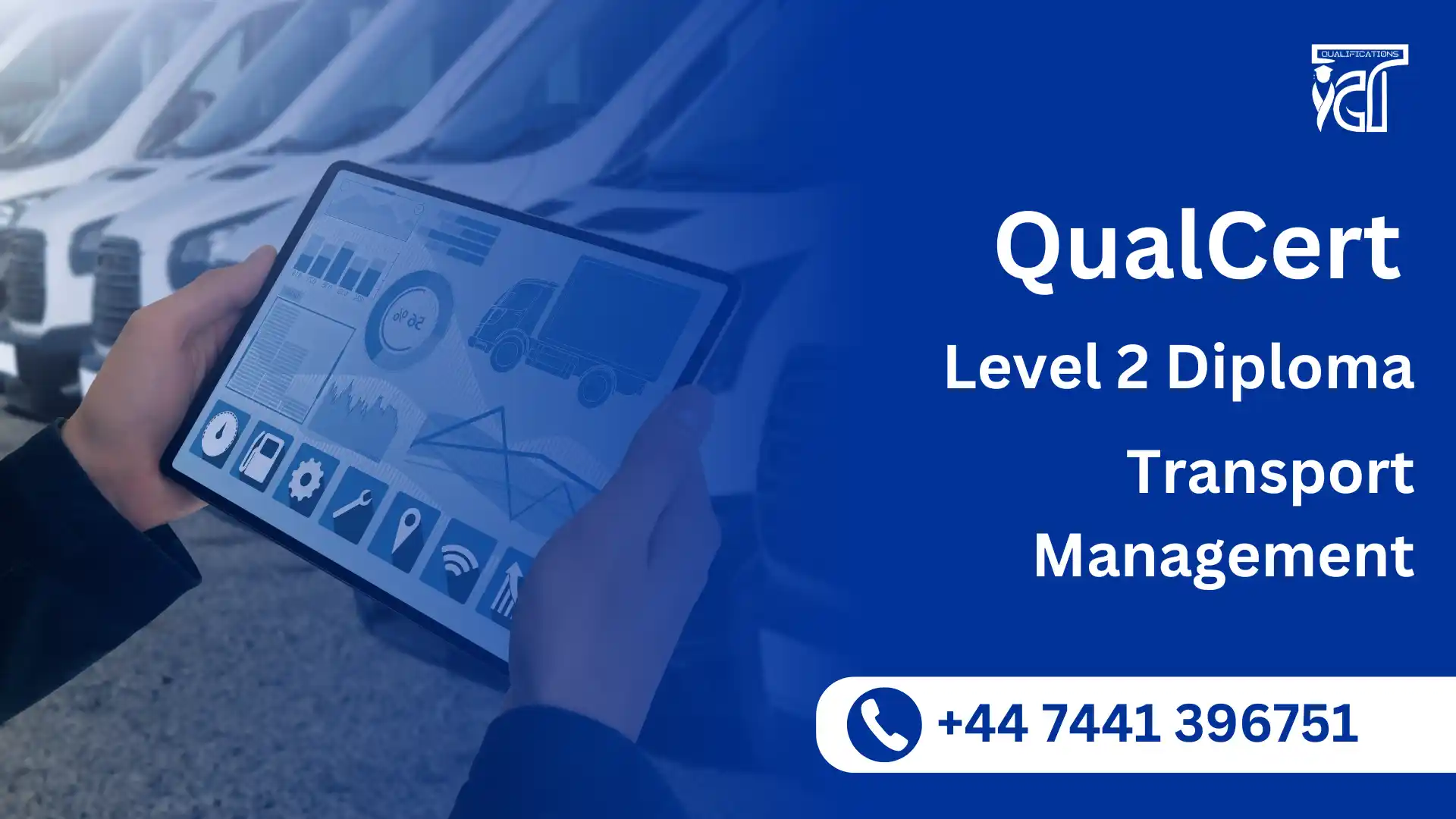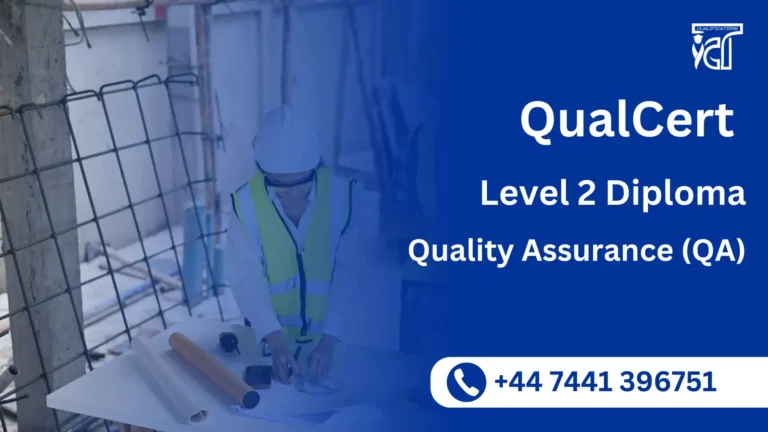The QualCert Level 2 Diploma in Transport Management is a comprehensive entry-level qualification tailored for individuals who are beginning their journey in the transport and logistics industry or are already working in supporting roles within transport operations. This diploma equips learners with a solid understanding of the fundamental principles of transport management, including vehicle coordination, route planning, legal compliance, and safety procedures.
With the transport and logistics sector rapidly evolving due to rising global demand, increased environmental concerns, and advanced fleet technologies, the need for trained professionals who can manage transport operations effectively is greater than ever. The QualCert Level 2 Diploma in Transport Management serves as a critical stepping stone for individuals looking to gain recognised credentials and contribute to the operational success of their organisation.
The QualCert Level 2 Diploma in Transport Management provides essential knowledge on how transport systems operate, what legal requirements govern the movement of goods and passengers, and how transport teams can improve efficiency, reduce costs, and maintain safety standards. It is designed to build both confidence and competence for those who are currently working as:
- Transport coordinators
- Dispatch assistants
- Traffic office clerks
- Delivery supervisors
- Fleet or vehicle support staff
- Warehouse operatives with transport responsibilities
Throughout the programme, learners are introduced to industry-relevant topics such as transport planning, scheduling, fleet maintenance, driver support, and record-keeping—all in the context of regulatory compliance and operational performance.
The QualCert Level 2 Diploma in Transport Management is ideal for those who wish to formalise their existing knowledge, upskill for career progression, or lay the foundation for further study in areas such as transport management, logistics coordination, or supply chain operations.
Whether you’re working in road transport, warehousing, passenger transport, or courier services, the QualCert Level 2 Diploma in Transport Management delivers practical insights and recognised skills to help you succeed and grow in your career.
QualCert Level 2 Diploma in Transport Management
The QualCert Level 2 Diploma in Transport Management, offers 42 Credits, requiring a Total Qualification Time (TQT) of 210 hours, including 150 Guided Learning Hours (GLH).
| Unit Ref# | Unit Title | Credit | GLH | TQT |
| QC06111-1 | Advanced Transport Management and Operations | 7 | 25 | 35 |
| QC06111–2 | Transport Compliance and Legal Frameworks | 7 | 25 | 35 |
| QC06111-3 | Supply Chain and Logistics Management | 7 | 25 | 35 |
| QC06111-4 | Customer Relationship Management | 7 | 25 | 35 |
| QC06111-5 | Risk Assessment and Incident Management | 7 | 25 | 35 |
| QC06111-6 | Transport Financial Planning and Budgeting | 7 | 25 | 35 |
GLH (Guided Learning Hours) and TQT (Total Qualification Time) are terms commonly used in vocational qualifications to help define the amount of time a learner is expected to spend on their studies.
1. GLH (Guided Learning Hours)
GLH refers to the number of hours a learner spends being directly taught, supervised, or supported during their course. This includes the time spent in activities such as:
- Classroom instruction
- Practical workshops
- One-on-one tutoring or mentoring sessions
- Online learning sessions with tutor support
In other words, GLH represents the time that learners are actively engaged with their instructors or learning activities.
2. TQT (Total Qualification Time)
TQT represents the total amount of time a learner is expected to invest in completing a qualification, including:
- GLH (Guided Learning Hours): Time spent on direct learning, as explained above.
- Self-Directed Learning: This includes time spent on independent study, research, assignment completion, preparation for exams, and any other work the learner does outside of direct teaching hours.
TQT is a broader measure that includes all the time required to achieve the qualification. It helps learners and employers understand the overall commitment required for the qualification.
Key Differences Between GLH and TQT:
- GLH focuses on direct learning with guidance or supervision.
- TQT includes GLH as well as independent study time and other learning-related activities.
Example:
If a qualification has a TQT of 600 hours and a GLH of 250 hours, it means the learner should spend 250 hours in direct learning (classroom, online, or tutor-led sessions) and 350 hours on independent study or research.
Learning Outcomes of QualCert Level 2 Diploma in Transport Management:
1. Advanced Transport Management and Operations
Learning Outcomes:
- Apply key principles of advanced transport planning and operational strategy.
- Manage the coordination of fleet activities, schedules, and resource allocation for efficiency.
- Identify operational challenges and implement solutions to improve performance and delivery timelines.
- Demonstrate knowledge of routing technologies and digital tools used in modern transport operations.
2. Transport Compliance and Legal Frameworks
Learning Outcomes:
- Understand the legal responsibilities of transport operators under UK and EU transport laws.
- Interpret key regulations relating to driver hours, tachographs, vehicle safety, and operator licensing.
- Apply procedures to ensure operational compliance and reduce legal risk.
- Recognize the consequences of non-compliance and methods of audit preparation.
3. Supply Chain and Logistics Management
Learning Outcomes:
- Explain the relationship between transport, warehousing, procurement, and inventory control in a supply chain.
- Evaluate supply chain processes to identify inefficiencies and areas for improvement.
- Understand logistics planning, order fulfillment, and distribution networks.
- Apply techniques to optimize goods movement and reduce lead times.
4. Customer Relationship Management (CRM)
Learning Outcomes:
- Understand the role of CRM in transport and logistics services.
- Apply effective communication strategies to enhance customer satisfaction and retention.
- Manage customer expectations during disruptions, delays, or incidents.
- Use feedback and data to drive improvements in service delivery.
5. Risk Assessment and Incident Management
Learning Outcomes:
- Conduct basic risk assessments in transport environments to identify hazards and assess risk levels.
- Implement preventive measures and contingency plans to manage operational risks.
- Understand reporting procedures for accidents, near misses, and regulatory breaches.
- Respond effectively to transport-related incidents using structured incident management protocols.
6. Transport Financial Planning and Budgeting
Learning Outcomes:
- Understand the principles of financial planning in transport operations.
- Prepare basic transport budgets and monitor cost performance.
- Identify key cost areas including fuel, maintenance, driver wages, and compliance-related expenses.
- Apply cost-control techniques to support operational efficiency and profitability.
Course Benefits: QualCert Level 2 Diploma in Transport Management
The QualCert Level 2 Diploma in Transport Management delivers a wide range of benefits to learners who are new to the transport and logistics industry or already in junior roles looking to gain formal qualifications. This practical, knowledge-rich programme strengthens the operational and regulatory skills required to support effective, safe, and legally compliant transport operations in a variety of sectors.
Here are the key benefits of this highly valuable qualification:
1. Gain an Industry-Recognised Qualification
Learners who successfully complete this diploma earn a respected Level 2 qualification that demonstrates their competence in transport operations and readiness for increased responsibility. This credential adds credibility to any CV or job application in the logistics, haulage, warehousing, or delivery services sectors.
2. Learn the Fundamentals of Transport Operations
The QualCert Level 2 Diploma in Transport Management offers a comprehensive introduction to essential topics such as:
- Fleet and vehicle scheduling
- Transport regulations and legal obligations
- Driver support and communication
- Route planning and efficiency
- Health, safety, and environmental responsibilities
These foundational skills are vital for maintaining high operational standards and supporting management teams in day-to-day transport activities.
3. Improve Job Performance and Confidence
By understanding how transport systems function and what regulations apply, learners become more effective in their current roles. Whether working as a transport assistant, dispatcher, or warehouse operative, learners gain the confidence to contribute proactively and professionally within their organisation.
4. Enhance Employability in a Growing Sector
Transport and logistics are among the fastest-growing sectors worldwide, with high demand for skilled workers. This diploma equips learners with the practical knowledge employers look for, making them more competitive candidates for roles in:
- Transport planning
- Fleet operations
- Customer logistics support
- Distribution and supply chain administration
5. Lay the Foundation for Career Progression
The QualCert Level 2 Diploma in Transport Management is an excellent stepping stone for further professional development. It prepares learners to advance to higher-level courses such as:
- QualCert Level 3 Diploma in Transport Management
- Diplomas in Logistics and Supply Chain Management
- CPC Transport Manager Certification (for Operator Licence compliance)
This clear progression pathway enables long-term career growth into supervisory or managerial roles.
6. Increase Understanding of Transport Laws and Safety
Transport professionals must be aware of relevant legal requirements, including driver regulations, vehicle safety checks, and environmental responsibilities. The QualCert Level 2 Diploma in Transport Management helps learners understand their role in maintaining compliance, reducing the risk of costly errors, penalties, or operational delays.
7. Contribute to Cost-Efficiency and Performance
Learners gain the skills to assist in efficient vehicle use, route optimisation, and fuel management. These areas are critical for businesses aiming to control transport costs and meet service targets. Staff who understand how to reduce waste and improve scheduling are highly valued in logistics teams.
8. Applicable Across Multiple Transport Environments
The QualCert Level 2 Diploma in Transport Management applies to a wide range of industries and transport functions, including:
- Road haulage and freight delivery
- Warehousing and distribution
- Public and passenger transport
- Courier and logistics services
- Local authority or municipal fleets
This versatility ensures that learners gain transferable skills useful across many types of employment.
9. Flexible Learning Designed for Working Professionals
The QualCert Level 2 Diploma in Transport Management is typically offered in flexible formats, including online or blended learning, allowing learners to complete the programme at their own pace while continuing to work. QualCert Level 2 Diploma in Transport Management is ideal for employees who want to upskill without disrupting their current job or schedule.
10. Build Personal Responsibility and Ethical Awareness
Beyond technical knowledge, the QualCert Level 2 Diploma in Transport Management also instills a sense of responsibility, professionalism, and teamwork—qualities essential for safe and reliable transport services. Learners develop an understanding of their ethical role in promoting safety, efficiency, and service excellence.
The QualCert Level 2 Diploma in Transport Management is specifically designed for individuals at the early stages of their careers in the transport or logistics industry, as well as those in support roles who want to gain formal knowledge and recognition. This qualification is ideal for learners who are seeking to develop practical transport skills, understand legal requirements, and prepare for more advanced responsibilities within transport operations.
Whether you’re working in vehicle coordination, warehouse logistics, delivery planning, or dispatch support, this course provides a strong foundation to grow your competence and confidence in a transport management environment.
Entry-Level Transport and Logistics Workers
The QualCert Level 2 Diploma in Transport Management is ideal for individuals who have recently entered the transport or logistics industry in a junior or assistant role. Common job titles for ideal learners include:
- Transport Assistant
- Fleet Clerk
- Logistics Support Worker
- Delivery Coordinator
- Dispatch Assistant
- Traffic Office Staff
- Warehouse Operative with Transport Duties
Learners in these roles are often involved in everyday transport functions such as booking deliveries, assisting with vehicle schedules, maintaining records, and supporting drivers. This diploma helps them understand the broader legal and operational context of their work.
School Leavers and Young Adults Entering the Workforce
The QualCert Level 2 Diploma in Transport Management is highly suitable for school leavers or young adults looking to begin a career in a fast-growing industry. With minimal academic requirements, the course serves as an accessible route into transport management and logistics, providing real-world skills and a clear progression pathway.
Career Changers and Adults Re-entering the Workforce
The QualCert Level 2 Diploma in Transport Management is also ideal for adult learners who are re-entering employment or transitioning into a new career. The transport industry offers abundant entry-level opportunities, and this diploma equips learners with the necessary foundational knowledge to secure and succeed in such roles.
Warehouse or Logistics Staff Expanding into Transport
Learners working in warehousing or stock management who want to broaden their career scope can use this course to shift into transport coordination roles. By understanding the movement of goods from depot to delivery, they can contribute more holistically to supply chain efficiency.
Small Business Employees and Delivery Team Members
Employees in small or medium-sized enterprises (SMEs), especially those involved in local delivery services, courier operations, or mobile services, often take on multiple roles. This course is perfect for team members who manage basic transport planning, liaise with drivers, or ensure vehicle readiness—even if it’s not their primary responsibility.
Those Planning to Progress to Higher-Level Qualifications
Ideal learners also include individuals who want to build up toward more senior roles or certifications in transport, logistics, or fleet management. The QualCert Level 2 Diploma in Transport Management provides a stepping stone to:
- Level 3 Diploma in Transport Management
- CPC Transport Manager Qualification
- Diplomas in Logistics, Warehousing, or Supply Chain Management
The Level 2 diploma helps learners gain the confidence, knowledge, and vocabulary needed to succeed at the next stage of their development.
Learners Needing Practical and Accessible Training
The QualCert Level 2 Diploma in Transport Management is ideal for individuals who prefer structured, practical training over academic theory. The content is delivered in clear, industry-relevant language and focuses on real-life applications, which makes it perfect for learners who thrive in hands-on, workplace-based learning environments.
Summary:
The ideal learner for the QualCert Level 2 Diploma in Transport Management is someone who:
- Is working in a junior or support role within transport or logistics
- Is looking to gain formal recognition and foundational transport knowledge
- May have limited academic qualifications but is eager to learn and progress
- Wants to contribute more confidently to team operations, safety, and compliance
- Plans to advance into a supervisory or management role in the future
- Values structured, practical, and career-focused learning
The QualCert Level 2 Diploma in Transport Management provides the gateway to long-term success in one of the world’s most dynamic and essential industries.
Entry Requirements
Register Now
Qualification Process
Qualification Process for the QualCert Level 2 Diploma in Transport Management
- Self-Assessment:
Begin by evaluating your eligibility to ensure you meet the qualification requirements, including work experience, knowledge, and language proficiency. - Registration:
Complete your registration by submitting the required documents, including a scanned copy of a valid ID, and paying the registration fee. - Induction:
An assessor will conduct an induction to confirm your eligibility for the course and explain the evidence requirements. If you do not meet the criteria, your registration will be canceled, and the fee will be refunded. - Assignmnets & Evidence Submission:
Provide all assignmnets and the necessary evidence based on the assessment criteria outlined in the course. If you are unsure of the required evidence, consult with the assessor for guidance on the type and nature of evidence needed. - Feedback and Revision:
The assessor will review your submitted evidence and provide feedback. Evidence that meets the criteria will be marked as “Criteria Met,” while any gaps will be identified. You will be asked to revise and resubmit if needed. - Competence Evidence:
Submit final evidence demonstrating that all learning outcomes have been met. This evidence will be marked as “Criteria Met” by the assessor once it is satisfactory. - Internal Quality Assurance (IQA):
The Internal Quality Assurance Verifier (IQA) will review your evidence to ensure consistency, quality, and compliance with standards. - External Verification:
The IQA will submit your portfolio to QualCert External Quality Assurance Verifiers (EQA) for final confirmation. The EQA may contact you directly to verify the authenticity of your evidence. - Certification:
Upon successful completion of all checks, QualCert will issue your official certificate, confirming that you have attained the QualCert Level 2 Diploma in Transport Management.







